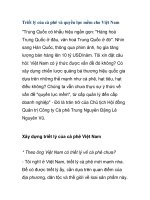Quyền lực mềm Soft power
Bạn đang xem bản rút gọn của tài liệu. Xem và tải ngay bản đầy đủ của tài liệu tại đây (309.01 KB, 3 trang )
Definition
Soft Power is a term developed by American Professor Joseph Samuel Nye, Jr. at Harvard
University for the first time in a book released in 1990, Bound to Lead: The Changing Nature
of America Power. According to Professor Joseph Nye, soft power is using the ability to get
what you want through influence to get others to do what you want. A feature of soft power is
that it is not coercive (kōˈərsiv). In contrast to soft power is hard power, which is based on
military and economic strength, hard power is exercised mainly by military threats (in life
such as dismissal, discipline, etc.) and economic attraction, bribe (brīb) (in life such as salary
increase, promotion).
Main domains/resources
A country's soft power, according to Nye, rests on three resources: "its culture (in places
where it is attractive to others), its political values (when it lives up to them at home and
abroad), and its foreign policies (when others see them as legitimate and having moral
authority)."
Benefits of Soft Power & A Strong Nation Brand
Experts agree that soft power delivers all kinds of benefits for nations, their people,
businesses, and organizations of all shapes and sizes. A strong nation brand and positive soft
power perceptions allow a nation to promote itself as a place for people to visit, invest in, and
build a reputation for their quality of goods and services. It also allows a country to rise in the
esteem of its neighbors, market its resources and compose the face it presents on the
international stage.
However, it is often overlooked that a strong nation brand and soft power can deliver better
outcomes at home. Primarily it encourages domestic tourism, the consumption of domestic
goods and services (rather than imports). Less tangibly it also just makes people feel better
about their country. The benefits are extensive, for both the nation and its citizens,
domestically and internationally.
But what specifically can and should governments and other large organizations do to assess
and improve their soft power credentials?
The starting point is to use soft power measurement to diagnose a nation’s strengths and
weaknesses. This, in turn, helps governments set priorities to improve global reputation and
guide policy strategy. Benchmarking and accountability are important to ensure projects
deliver tangible returns.
Communication and education are key. In some cases, soft power may be constrained
because of the poor communication of a nation’s strengths and resources. This limits the
potential of a nation brand. However, this is often easily addressed with a communications
strategy.
A good understanding of your existing reputation, brand equity, and the misperceptions
which need to be corrected is the first step for effective communication and utilization of a
nation’s soft power.
Why does soft power matter to corporate brands?
Soft power perceptions form a key component in the overall measurement of a nation’s brand
strength. While soft power is the ability to influence actors, a nation brand puts that ability
into practice.
A mutually beneficial relationship exists for nation brands and the corporations that originate
from and associate themselves with that nation. A country’s nation brand facilitates location
branding which encompasses nation, region, and city branding. Through this both local and
global businesses strive to create visual, emotional, and perceptual connections with locations
in order to market their products and services.
The concept stems from the idea that places evoke strong emotional connections that are
highly effective in conveying characteristics and perceptions that are associated with the
location. This is evident with German automobile manufacturers that regularly leverage the
nation’s reputation in the field to differentiate their cars.
Location branding also creates a symbiotic relationship between nations and corporations
where corporate brands act as brand ambassadors for the nation on the world stage. Singapore
Airlines, for example, has become an iconic brand ambassador for its home city-state.
The airlines’ heritage, history, and branding are deeply rooted in the nation’s identity. This is
evident in their marketing that frequently features local elements which can be considered
both an advertisement for the airline as well as a tourism campaign for the nation.
A nation’s attractiveness and soft power will impact most brands and businesses – especially
those with very clear national origins and associations. The following 5 areas outline the
various ways in which corporations can leverage and utilize soft power perceptions.









